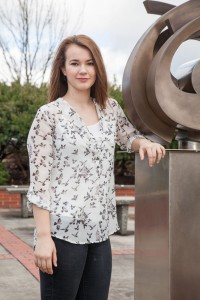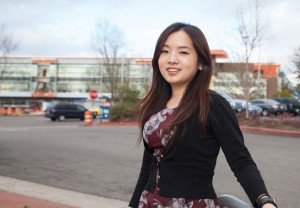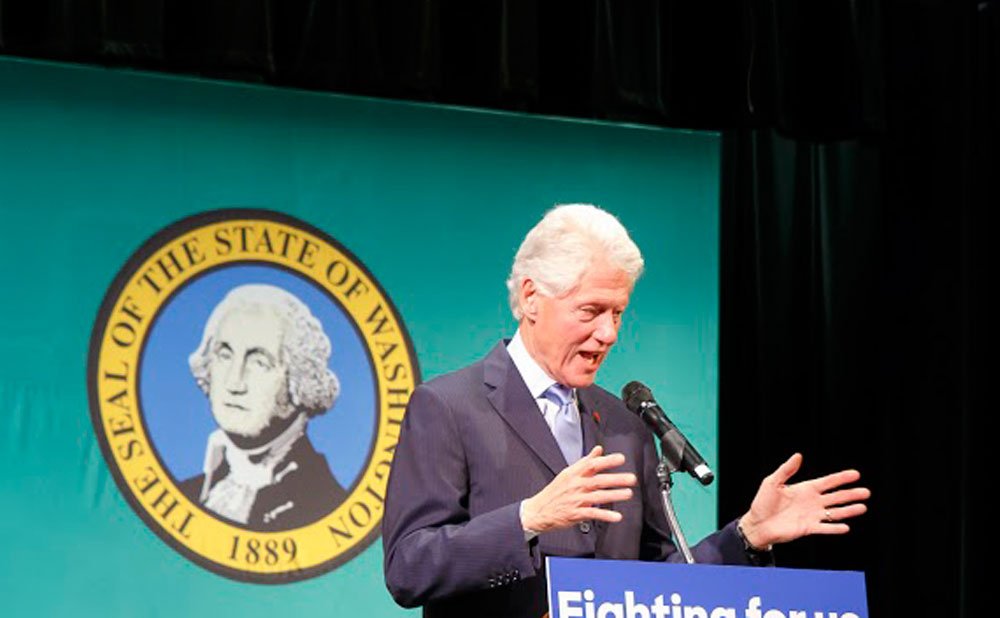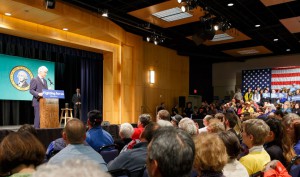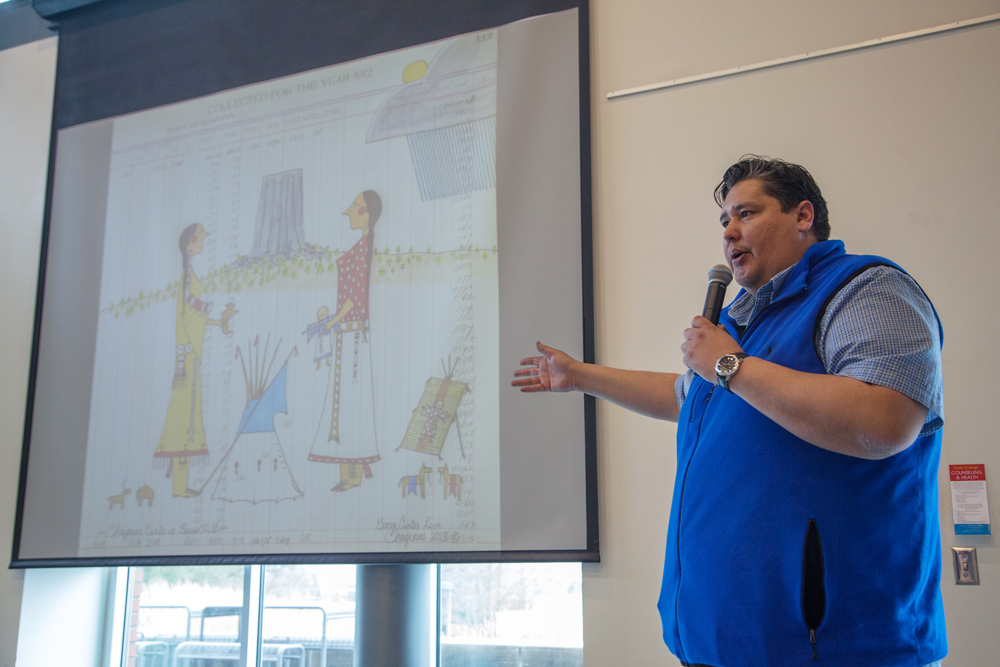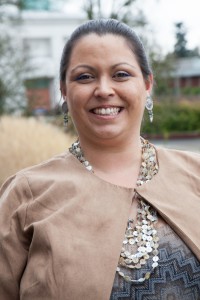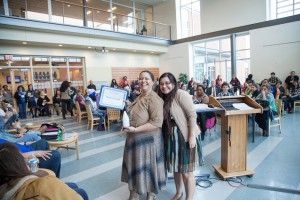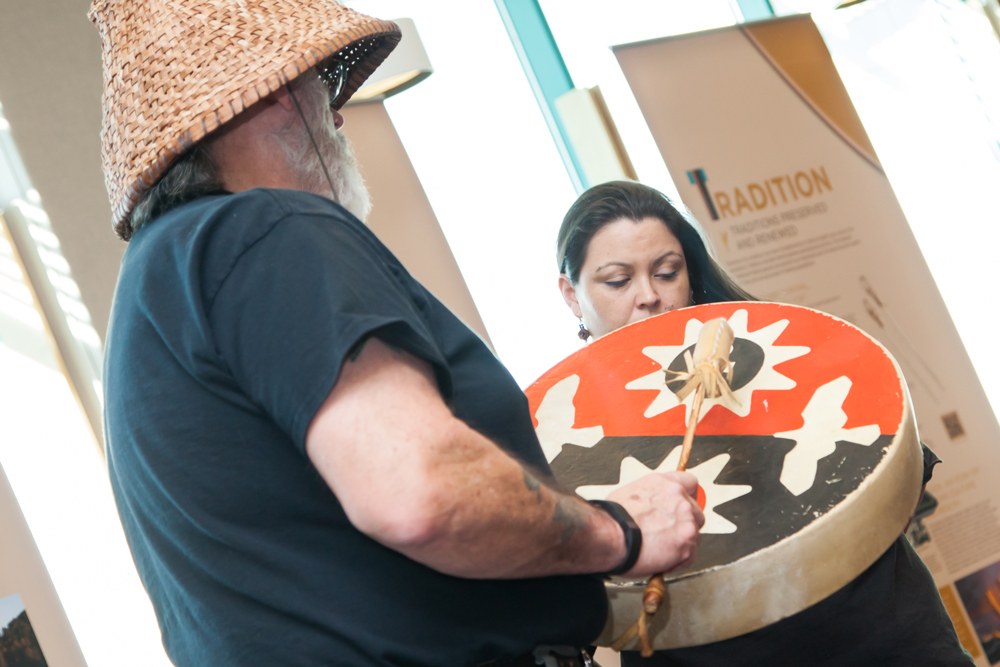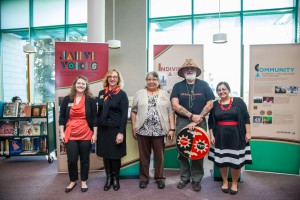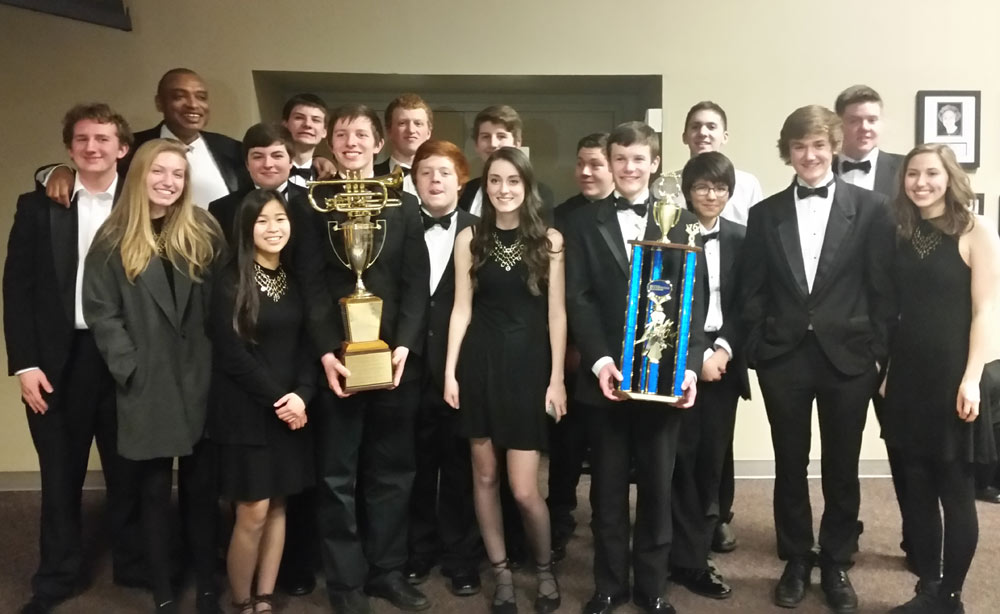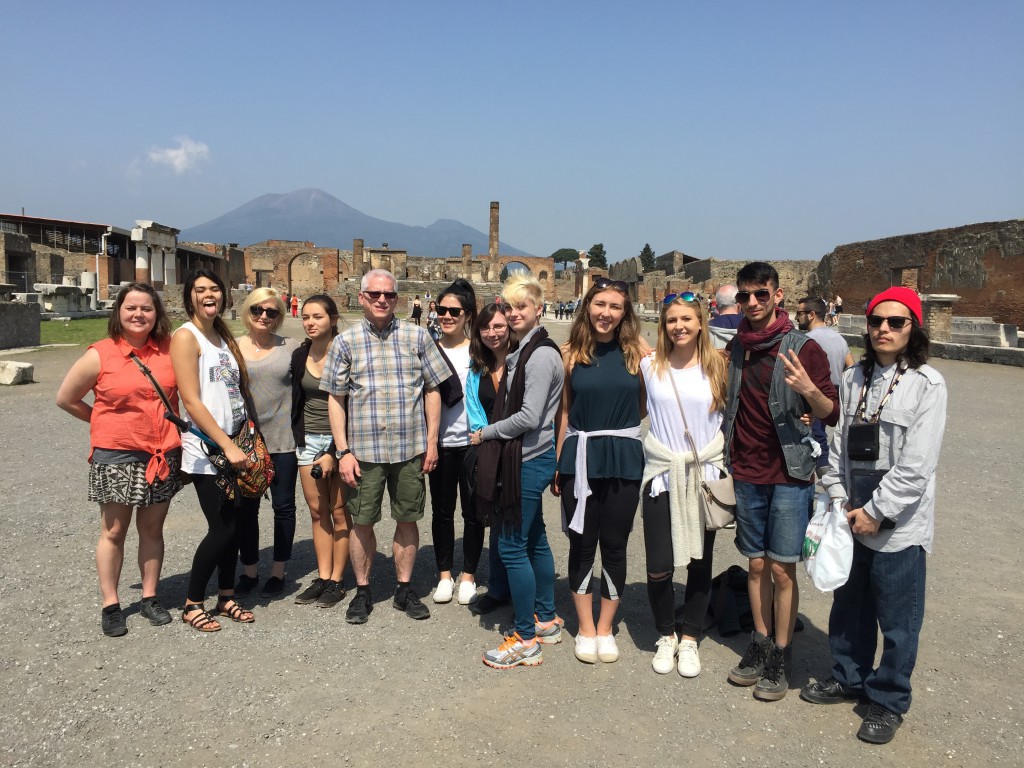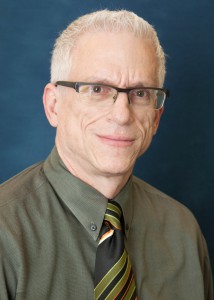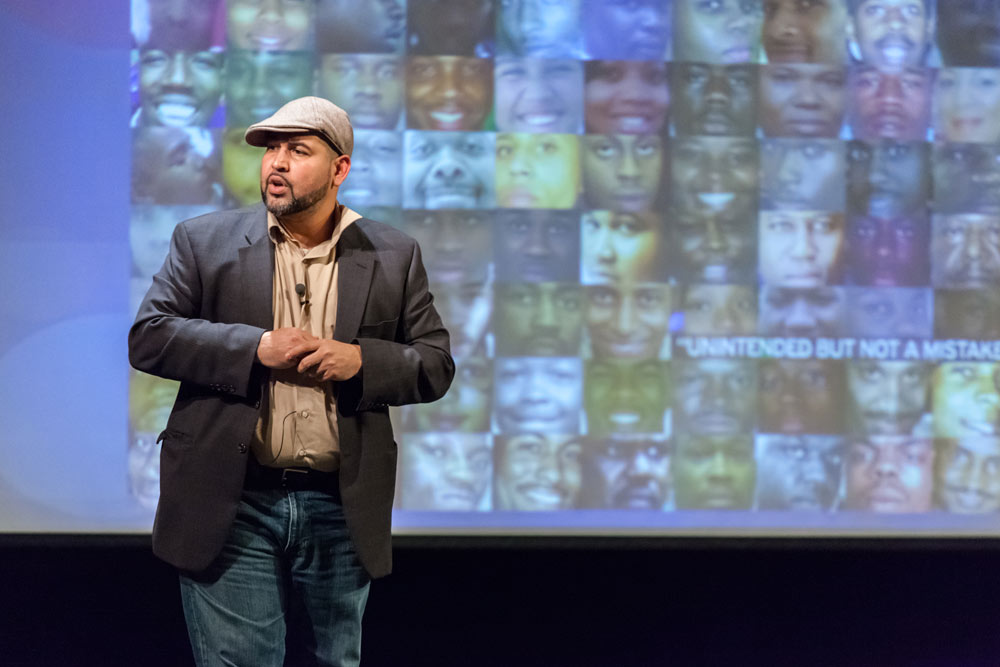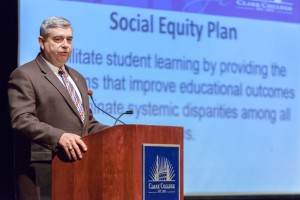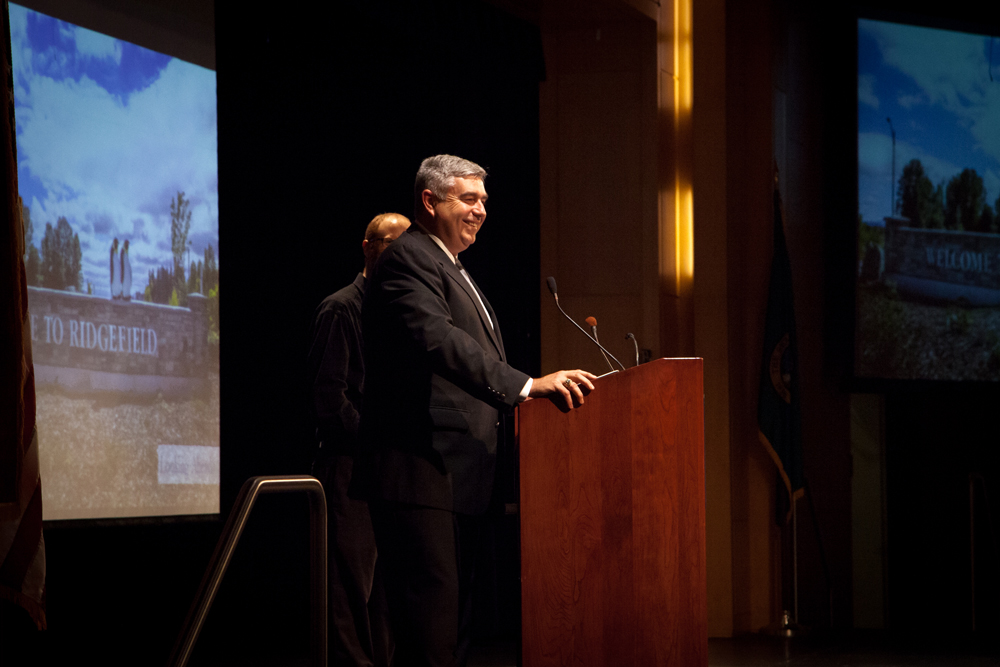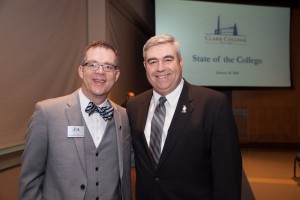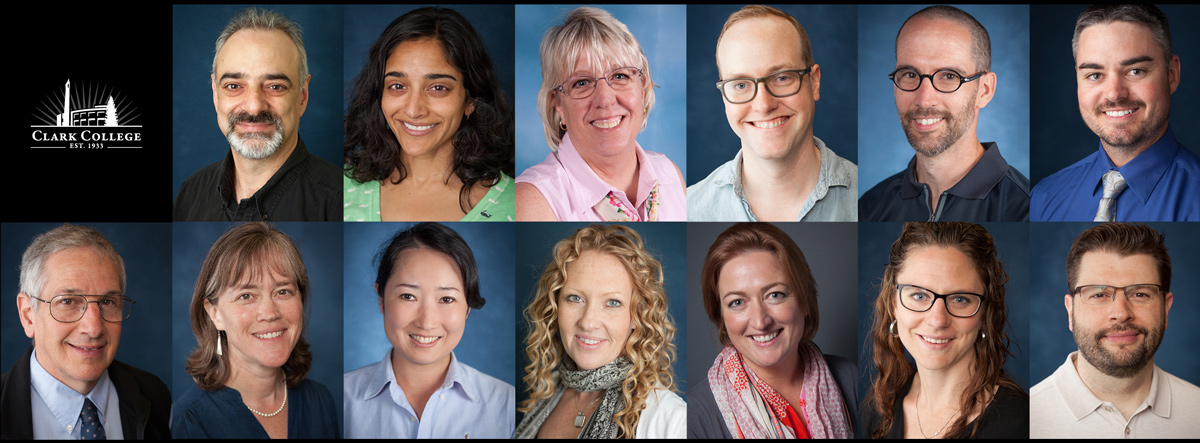 Thirteen outstanding educators are the newest members of the tenured faculty at Clark College. Dr. Roberto Anitori (biology), Kushlani de Soyza (women’s studies), Dee Anne Finken (journalism), Grant Hottle (art), Garrett Hoyt (health and physical education), Drew Johnson (business technology), Kenneth Luchini (mechatronics), Sarah Luther (mathematics), Dr. Mika Maruyama (psychology), Heather McAfee (geography), Natalie Miles (transitional studies language arts), Erin Schoenlein (transitional studies math), and Caleb White (welding) were all granted tenure during the Clark College Board of Trustees meeting on March 16.
Thirteen outstanding educators are the newest members of the tenured faculty at Clark College. Dr. Roberto Anitori (biology), Kushlani de Soyza (women’s studies), Dee Anne Finken (journalism), Grant Hottle (art), Garrett Hoyt (health and physical education), Drew Johnson (business technology), Kenneth Luchini (mechatronics), Sarah Luther (mathematics), Dr. Mika Maruyama (psychology), Heather McAfee (geography), Natalie Miles (transitional studies language arts), Erin Schoenlein (transitional studies math), and Caleb White (welding) were all granted tenure during the Clark College Board of Trustees meeting on March 16.
Tenure is awarded by the college’s Board of Trustees based on professional excellence and outstanding abilities in their disciplines. The granting of tenure is based on the recommendations of tenure review committees to the vice president of instruction, which are then forwarded to the president, who presents a final recommendation to the Board of Trustees. Recommendations are based on self-evaluations, tenure review committee evaluations, student evaluations, supervisory evaluations, and peer evaluations. The final decision to award or withhold tenure rests with the Board of Trustees.
“Tenure is an important moment for both faculty and the college,” said Dr. Tim Cook, Vice President of Instruction. “For the faculty, this shows the college’s confidence in their skills and dedication; for the college, these faculty will help develop Clark’s curriculum and character for many years to come. I’m happy to congratulate these talented and passionate educators and I look forward to watching them help shape our college community.”
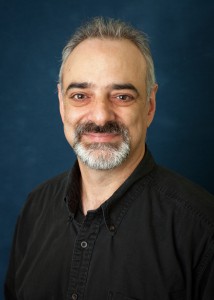 Dr. Roberto Anitori, Biology
Dr. Roberto Anitori, Biology
After earning both his bachelor’s and doctoral degrees in Molecular Biology and Microbiology from the University of New South Wales in Sydney, Australia, Dr. Roberto Anitori worked in research labs at Macquarie University in Sydney and at Oregon Health and Science University. He has extensive experience researching “extremophiles,” microbes that have adapted to survive in environments where most living things could not. He has researched extremophiles in Antartica, volcanoes, deep-sea vents, underground water tables, deserts, and radioactive hot springs. He has been invited to lecture by organizations including the Australian Society for Microbiology, the Geological Society of Australia, and NASA. In 2011, he received the Antarctica Service Medal from the National Science Foundation. Dr. Anitori began teaching microbiology at Clark in 2008. He is the editor of the book Extremophiles: Microbiology and Biotechnology (2012, Horizon Press).
At Clark, Dr. Anitori serves as the faculty co-lead for undergraduate research-based student activities, and the lead instructor for microbiology. He also participated in the college’s Faculty Speaker Series.
Dr. Anitori said, “I try to relate the material I teach to the real world, and also infuse my instruction with information from my more than two decades of scientific research experience.”
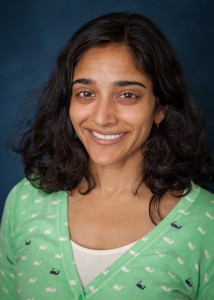 Kushlani de Soyza, Women’s Studies
Kushlani de Soyza, Women’s Studies
Kushlani de Soyza earned her bachelor’s degree in journalism from Northwestern University. She has a Master of Education degree in secondary education/English from the University of Cincinnati, a Master of Arts degree from Portland State University, and a Master of Fine Arts in creative writing from Oregon State University. De Soyza has previous work experience at the Cincinnati Post, St. Xavier High School, University of Virginia, Oregon State University, and APA Compass Radio.
At Clark, de Soyza serves as chair of the Clark College Ann Virtu Snyder Women’s Studies Scholarship Committee.
“My goal as a teacher is to create a classroom experience where learners of all backgrounds can listen, learn, and express themselves in an atmosphere based on mutual respect,” she says. “The Women’s Studies classroom is a space where students work together to understand how systems of power, privilege and inequity apply to their own experiences and to the social, political, and cultural institutions that shape our lives.”
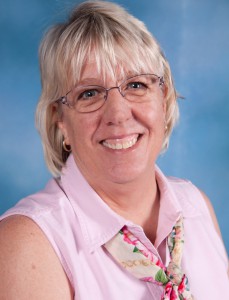 Dee Anne Finken, Journalism
Dee Anne Finken, Journalism
Dee Anne Finken earned bachelor’s degrees in journalism and English from California State University and Washington State University. She has a Master of Fine Arts degree in creative non-fiction from Portland State University. Prior to teaching at Clark, Finken spent more than two decades as a print journalist.
Finken serves as the faculty advisor to Clark’s award-winning student news source, The Independent. She also leads the college’s journalism program and founded the college’s Student Media Advisory Committee.
“In teaching journalism, I hope to support students to become more thoughtful and engaged citizens of the wider world,” said Finken.
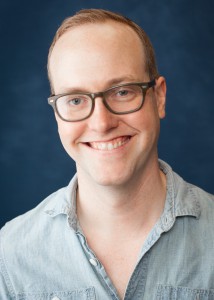 Grant Hottle, Art
Grant Hottle, Art
Grant Hottle attended the Utrecht School of the Arts before earning his Bachelor of Fine Arts degree in painting from the University of Oklahoma. He then went on to earn his master’s degree in painting and drawing from the University of Oregon. Hottle has previous work experience at the University of Oregon, Oregon State University, Lewis and Clark College, Marylhurst University, Anderson Ranch Arts Center in Colorado, Oregon College of Art and Craft, and Clark College.
Hottle serves as head of Clark College’s painting and foundations area, coordinating adjuncts and managing department curricula in drawing, painting, design, and color theory. He is a faculty advisor for the Clark College Art Club and a member of the Outcomes Assessment Committee. He also worked with an English faculty member to design a popular Integrated Learning Community on the “Craft of Comics.”
“My classes exist to empower each student’s strategy of personal expression and to awaken them to the role art can play in their development as professionals and as free-thinking adults,” said Hottle. “I focus on drawing and design fundamentals through a process-based understanding of materials while exposing students to the broader cultural relevance of art beyond the studio.”
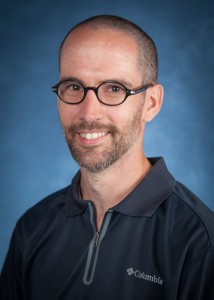 Dr. Garrett Hoyt, Health and Physical Education
Dr. Garrett Hoyt, Health and Physical Education
Dr. Garrett Hoyt earned his Bachelor of Science degree in exercise science from Brigham Young University and his Master of Science degree in exercise physiology from Colorado State University. He has a Ph.D. in exercise science/health promotion, also from Brigham Young University. He has previous work experience at Brigham Young University and the YMCA of Central Kentucky and is the founder and owner of Healthy Steps In-Home Personal Training.
Dr. Hoyt, who has taught at Clark since 2011, currently serves on its Associate of Arts Advisory Committee. He has spent significant time studying nutrition and is currently starting a small sustainable farm.
“I believe in the quote often attributed to Galileo: ‘You can’t teach a man anything; you can only help him find it within himself,’” said Dr. Hoyt. “Teaching is less about presenting facts and more about encouraging students to discover things for themselves.”
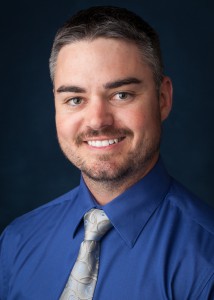 Drew Johnson, Business Technology
Drew Johnson, Business Technology
Drew Johnson earned his bachelor’s degree in marketing from George Fox University and his master’s degree in secondary education from the University of Phoenix. He has taught in Clark College’s Business Technology department since 2011.
Johnson serves on the Clark College Retention Committee and is an active member of his department, working on curriculum and outcomes for the past five years.
Johnson described his teaching style by saying, “I attempt to deliver materials using several different methods in order to reach multiple learning styles. I also try to bring a real-world approach to the classroom by presenting assignments and materials that students can relate to, based on scenarios they may encounter in the workforce.”
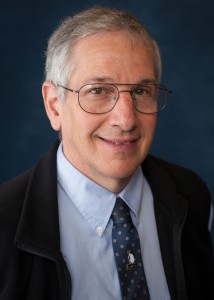 Kenneth (Ken) Luchini, Mechatronics
Kenneth (Ken) Luchini, Mechatronics
Kenneth Luchini earned his associate degree in industrial electronics from Diablo Valley College in California. He earned his Bachelor of Science degree in industrial electronics and computer technology from California State University Chico, and completed Master Studies in instructional processes in vocational education at the University of California Berkeley Extension. His work experience includes more than two decades as an electrical engineer, as well as 10 years as an electronics technician and eight years as a full-time college vocational education instructor in electronics and industrial automation.
Luchini serves as the faculty advisor for the MechNerds, Clark College’s student club devoted to mechatronics. He is also co-principal investigator for the Clark College Rural Access Mechatronics Program (RAMP), a program that would develop “hybrid” (combination online and face-to-face) curriculum to serve rural portions of the college’s service district through a proposed grant from the National Science Foundation’s Advanced Technological Education program.
Luchini summed up his teaching philosophy as “listen to others, see where they and their questions are coming from, and give or guide them to the information they want, so that they can use information right away and/or build upon it for technical skills and intellectual development.”
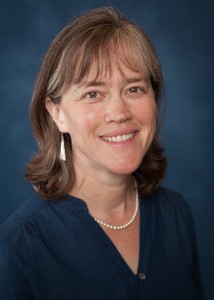 Sarah Luther, Mathematics
Sarah Luther, Mathematics
Sarah Luther earned her Bachelor of Arts with a major in English and a minor in mathematics from Lewis and Clark College. She also earned her Master of Arts in Teaching degree in secondary education from Lewis and Clark. She earned her Master of Science in mathematics from Texas A&M University. Luther has previous work experience as a middle-school math teacher in Portland, Oregon; a mathematics editor and textbook problem writer for IPS Publishing in Vancouver, Washington; and as a mathematics faculty member at both Umpqua Community College and Clark College.
In addition to volunteering as a tutor in Clark’s Women in STEM tutoring center, Luther frequently volunteers with Mathematics Department activities and outreach. She serves on the college’s International Education Committee and its Academic Standards Committee, and coordinates quarterly advising for all pre-college math students.
“My teaching philosophy centers around the belief that all students are capable of understanding mathematics,” Luther said. “Therefore my goal is to create a supportive community in which this learning can occur. Using a dynamic, interactive approach, I want to draw my students in to the beauty of math to help inspire enjoyment of the subject. “
Dr. Mika 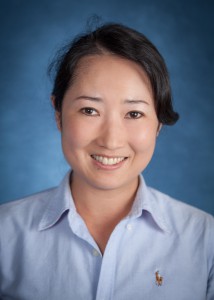 Maruyama, Psychology
Maruyama, Psychology
Dr. Maruyama earned her bachelor’s degree from Utah State University and both her master’s and doctorate degrees in psychology from Portland State University. She has previous work experience at Portland State University, Oregon University System, University of Phoenix, Portland Community College, Mt. Hood Community College, and Clark College.
A native of Japan, Dr. Maruyama has studied human development in both American and Japanese society as well as social issues including animal cruelty, domestic violence, child maltreatment, and juvenile delinquency. She has contributed to numerous academic journals, handbooks, and textbooks, including Animal Abuse and Developmental Psychopathology (2010, APA Books), Human Development (2008, Wadsworth Publishing), and International Handbook of Theory and Research on Animal Abuse and Cruelty (2008, Purdue University Press).
At Clark, Dr. Maruyama serves on the BUILD EXITO Program Committee. She is also collaborating on a research project with Portland State University on the effectiveness of using virtual reality to influence health, and she is the principal investigator in a research project on humane education programs in the U.S.
Dr. Maruyama said, “My ultimate goal as a teacher is to positively influence students in how they view themselves and society by providing them with tools for understanding psychological principles that they can use outside of the classroom.”
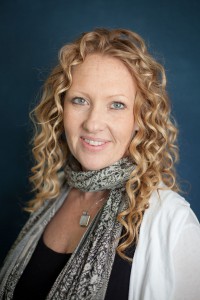 Heather J. McAfee, Geography
Heather J. McAfee, Geography
Heather McAfee earned her Bachelor of Arts degree in political science/women and gender studies from the University of Colorado. She earned her Master of Arts degree in geography from the University of Oregon. She has previous work experience at the University of Oregon, Clark College, and as a Senior Human Terrain Analyst serving in Baghdad for the U.S. Army.
Currently McAfee serves as the chair of Clark College’s Geography Department. She is also a member of the college’s Associate of Arts Transfer Committee and the Learning Communities Taskforce, as well as a volunteer with the Library of the Future Taskforce.
“Since the purpose of schooling is to prepare students to live effectively in the world, it makes sense to put the needs of students in the spotlight,” McAfee said of her teaching philosophy. “I engage geography students though real-world examples, self-discovery, and creating a safe space to invite conversation about ‘big ideas’ and how they connect to their own experiences.”
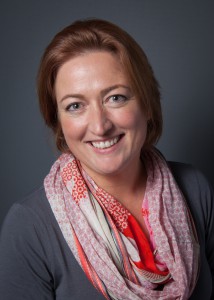 Natalie Miles, Transitional Studies Language Arts
Natalie Miles, Transitional Studies Language Arts
Natalie Miles earned her bachelor’s and master’s degrees in education from Valley City State University in North Dakota. She has previous teaching experience at Grays Harbor College, Centralia College, Lower Columbia College, and Clark College; additionally, she has worked as a literacy specialist for the Evergreen School District.
At Clark, Miles serves as the BEECH Unit representative to the Teaching and Learning Advisory Committee and to the Tech Fee Committee. She has also been instrumental in designing curriculum for the High School 21+ English Pathways, Academic I-BEST, and the Early Childhood Education I-BEST. Miles developed quarterly tutor-training workshops for the Transitional Studies Tutor Center and volunteered as a mentor with First Year Experience.
“I believe my primary role is to encourage students to see their own potential to succeed,” said Miles. “I motivate students using a student-centered approach and differentiated instruction, whereby enabling me to guide them through content needed to meet competencies. I am thrilled to help students transition to their next steps at Clark.”
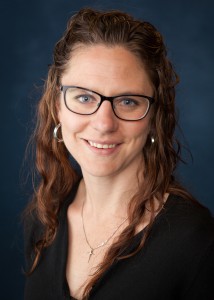 Erin Schoenlein, Transitional Studies Mathematics
Erin Schoenlein, Transitional Studies Mathematics
Erin Schoenlein earned her bachelor’s degree in accounting from the University of Portland. She earned her Master of Arts in Teaching from that institution as well. While working on her master’s degree, she assisted in the opening of St. Andrew Nativity School in Northeast Portland. Upon graduation, she taught mathematics and science at Wy’east Middle School in Portland. Schoenlein has taught at Clark since 2008.
Schoenlein serves as lead of Clark College’s Transitional Studies Math Cohort and of its Bridge to College Higher Education. She also helped develop curriculum for its High School 21+ program.
“I strive to be student centered in my teaching and curriculum development,” Schoenlein said. “My focus is to change the lives of the students I am lucky enough to support.”
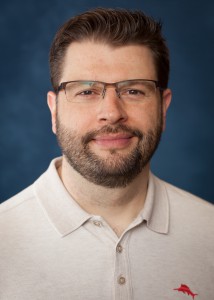 Caleb White, Welding
Caleb White, Welding
Caleb White earned an associate degree in automotive and diesel technology from the Universal Technical Institute and a certificate of completion in welding technology from Clark College. He is currently working on an Associate of Applied Technology in welding technology from Clark College as well. White has more than a decade of work experience as a welder and fabricator, including 10 years as a mechanic shop foreman at Christensen Shipyards.
White has taught at Clark College since 2012. He currently serves as department head of Welding and Fabrication Technology.
“My approach to teaching is to teach a wide range of skill-sets so students can handle the changes of industry throughout their careers,” said White. “My teaching style is very conversational and I challenge the students along the way. My goal is not to teach students everything they would have to know in industry, but the skill-sets and problem-solving abilities to work through any situation they might encounter.”
Photos: Clark College/Jenny Shadley

